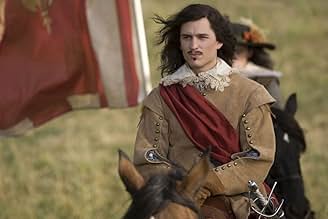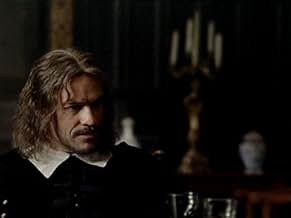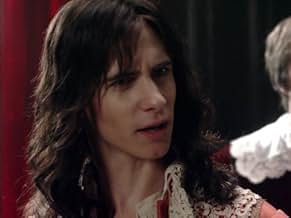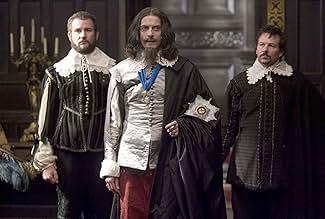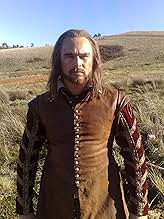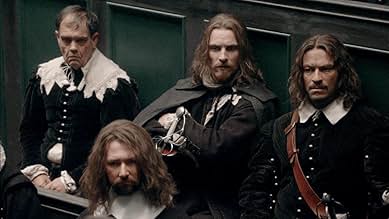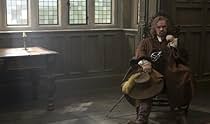IMDb-BEWERTUNG
7,0/10
2853
IHRE BEWERTUNG
Der englische Bürgerkrieg aus der Sicht eines findigen, manipulativen und verzweifelten 17-jährigen Mädchens, das alles tut, um zu überleben.Der englische Bürgerkrieg aus der Sicht eines findigen, manipulativen und verzweifelten 17-jährigen Mädchens, das alles tut, um zu überleben.Der englische Bürgerkrieg aus der Sicht eines findigen, manipulativen und verzweifelten 17-jährigen Mädchens, das alles tut, um zu überleben.
- 1 BAFTA Award gewonnen
- 8 Gewinne & 7 Nominierungen insgesamt
Folgen durchsuchen
Empfohlene Bewertungen
An amazingly compact narrative packs a remarkable amount of emotion and philosophical musing into a sweeping narrative; this is television that delivers all the satisfactions of the old-fashioned novel.
With a title like "The Devil's Whore" we are prepared for a rip-roaring bodice-ripper...and while bodices are indeed ripped...nay, shredded!...there is oh so much more going on here. Love long-denied over decades of tumultuous civil war, labyrinthine tests of loyalty, vengeance played out over decades, and various other devices create a nonstop narrative drive; try coming to the end of one episode without wanting to watch the next one at once. But at the very heart of this story is an inquiry into the deepest questions of existence: who are we amid our fellow humans, what force or forces rule the universe, and what does freedom really mean? A restless intelligence moves through this story, suffusing it with heartbreaking insight.
Kudos to the whole cast, to a counter-intuitive musical track, and to the splendid visual sense that informs the whole production.
The only thing that stops me from giving 10 stars is a certain dissatisfaction with the ending. Granted, the filmmakers face an almost impossible task to create a moment of transcendence to match all that has come before. Maybe on a second viewing I will change my mind about that.
With a title like "The Devil's Whore" we are prepared for a rip-roaring bodice-ripper...and while bodices are indeed ripped...nay, shredded!...there is oh so much more going on here. Love long-denied over decades of tumultuous civil war, labyrinthine tests of loyalty, vengeance played out over decades, and various other devices create a nonstop narrative drive; try coming to the end of one episode without wanting to watch the next one at once. But at the very heart of this story is an inquiry into the deepest questions of existence: who are we amid our fellow humans, what force or forces rule the universe, and what does freedom really mean? A restless intelligence moves through this story, suffusing it with heartbreaking insight.
Kudos to the whole cast, to a counter-intuitive musical track, and to the splendid visual sense that informs the whole production.
The only thing that stops me from giving 10 stars is a certain dissatisfaction with the ending. Granted, the filmmakers face an almost impossible task to create a moment of transcendence to match all that has come before. Maybe on a second viewing I will change my mind about that.
Well, I had high hopes for this mini series from across the Atlantic, and some of those expectations were met, but, as I should have expected, others were dashed.
The production values are of high caliber. Costumes, sets and locations, particularly for a British mini series, are all exceptional. There's very little in the way of criticism when it comes to poking at the amount of money and care that went into the recreation of late renaissance Britain. Truly, a first rate production where all imagery is concerned.
So where does this small collection of films fall flat? This is going to sound sexist, but it truly isn't, it's a comment aimed at the continued market trend for television; the series was aimed specifically at a female audience with only the superficiality of placating to masculine interests. Every male in this series of films is portrayed as boorish on some level. From Royalists to Parliamentarians, and shades of gray in-between, few of these men have a spine.
Additionally, they're all sex starved. They either are biding their time for sexual favors, or are so wanton as to be willing to force themselves on he fairer sex. They seem to have little else on their minds. And when they are granted female accompaniment, they then squander their "victory" in some sort of stupidity.
That's not really a comment on what I think of society as I think of what TV producers think their audiences want to see. Again, as I've written in other reviews, the TV producer thinking is that since women buy things for the home, it is therefore that audience that the shows must cater to.
"The Devil's Whore" is no different. The concepts and ideals for which both sides of the English Civil War fought are hardly ever mentioned. It seems to be the assumption that said notions have no place within the female psyche, and therefore are not worth exposition. Female concerns are for family, friends and young ones.
So what does one do? The man who watches this can do little but shake his head, and maybe say "Huh, the 60's film with Richard Harris was a bit more entertaining..." Which, in my view, it was.
But the film with Harris had the benefit of being a high budget major theatrical film. It wasn't some one off made for TV mini series that had to compete with "Dancing with the Stars" or other sub-IQ fodder that masks for entertainment.
You may say, "Mister Blueghost, what were you expecting?" Look, I knew this was going to be a TV miniseries about a woman during the English Civil War, but I expected the Powers-that-Be in the UK to do their usual bucking of American market research, and make a film for both sexes and most ages. Something intelligent. Something with a little more purposeful action than the banal placation presented in this film's battle-sequences.
In short, it was a pleasure to see something not made by and for American house-wives and professional women, but it was equally disappointing to see something made for British house-wives and professional women.
*sigh*
Well, maybe I'll whip out my copy of Cromwell tonight, and grin as I see Richard Harris give a high energy performance in his Irish-thesping style of portraying a historic figure who didn't like the Irish a great deal.
Well, I think I've learned my lesson about splurging on a UK TV series of which I know nothing.
Watch at your risk.
The production values are of high caliber. Costumes, sets and locations, particularly for a British mini series, are all exceptional. There's very little in the way of criticism when it comes to poking at the amount of money and care that went into the recreation of late renaissance Britain. Truly, a first rate production where all imagery is concerned.
So where does this small collection of films fall flat? This is going to sound sexist, but it truly isn't, it's a comment aimed at the continued market trend for television; the series was aimed specifically at a female audience with only the superficiality of placating to masculine interests. Every male in this series of films is portrayed as boorish on some level. From Royalists to Parliamentarians, and shades of gray in-between, few of these men have a spine.
Additionally, they're all sex starved. They either are biding their time for sexual favors, or are so wanton as to be willing to force themselves on he fairer sex. They seem to have little else on their minds. And when they are granted female accompaniment, they then squander their "victory" in some sort of stupidity.
That's not really a comment on what I think of society as I think of what TV producers think their audiences want to see. Again, as I've written in other reviews, the TV producer thinking is that since women buy things for the home, it is therefore that audience that the shows must cater to.
"The Devil's Whore" is no different. The concepts and ideals for which both sides of the English Civil War fought are hardly ever mentioned. It seems to be the assumption that said notions have no place within the female psyche, and therefore are not worth exposition. Female concerns are for family, friends and young ones.
So what does one do? The man who watches this can do little but shake his head, and maybe say "Huh, the 60's film with Richard Harris was a bit more entertaining..." Which, in my view, it was.
But the film with Harris had the benefit of being a high budget major theatrical film. It wasn't some one off made for TV mini series that had to compete with "Dancing with the Stars" or other sub-IQ fodder that masks for entertainment.
You may say, "Mister Blueghost, what were you expecting?" Look, I knew this was going to be a TV miniseries about a woman during the English Civil War, but I expected the Powers-that-Be in the UK to do their usual bucking of American market research, and make a film for both sexes and most ages. Something intelligent. Something with a little more purposeful action than the banal placation presented in this film's battle-sequences.
In short, it was a pleasure to see something not made by and for American house-wives and professional women, but it was equally disappointing to see something made for British house-wives and professional women.
*sigh*
Well, maybe I'll whip out my copy of Cromwell tonight, and grin as I see Richard Harris give a high energy performance in his Irish-thesping style of portraying a historic figure who didn't like the Irish a great deal.
Well, I think I've learned my lesson about splurging on a UK TV series of which I know nothing.
Watch at your risk.
Peter Flannery wrote one of the finest dramatic accounts of recent history, the epic television series 'Our Friends in the North', but sadly, his attempt to write about the English Civil War is a far inferior affair. To me, the essence of good historical drama is that it distances us from our own times, and allows us to see how others could have held positions that seem to us indefensible; but 'The Devil's Whore' invents a fictitious female heroine, beautiful and anachronistically feisty (and involved in a story line that could have been borrowed from 'Thelma and Lousie'!) who seems to exist for the sole purpose of allowing us to judge the past through a modern pair of eyes. The writer also clearly wanted a share of the market for posh-frock romances, and the possibility of a happy end, while also putting this unlikely figure on the "right" side of the conflict - hence, wholly implausibly, our heroine is rendered as an aristocratic Leveller. The drama's general sympathy for the Levellers (and associated proto-socialist movements) is also overdone, in that the characters with attractive politics are consistently shows to be morally superior, and more likable, than those without. Against, the contrast with 'Our Friends', whose general sympathies for the Labour cause did not reduce the story to a black and white tale, is clear. The only really interesting character in this story is the Charles I, knowledge of whose execution perhaps invokes a certain involuntary sympathy on the part of the viewer, and who is suavely played by Peter Capaldi. But overall, 'The Devils Whore' is part Hollywood narrative , part Jane Austen and a sprinkling of socialism: an odd combination, and a disappointment compared with Flannery's best.
THE DEVIL'S MISTRESS (The Devil's Wh*re) (2008) was a pretty interesting series, that immediately drew me in with promises to learn more of the mysteries of the English Civil War (1636 - 1660) though it didn't necessarily live up to the high expectations it set in that regard, it was however, studded with a cast of stars, who all played their parts marvelously, flaws or not and offered insights into the era's turbulence, as well as political, social, moral, religious and sexual politics of the day, if not beheld from a modern eye.
It follows Angelica Fanshawe (Andrea Riseborough), a young "modern-minded" woman who sees strange visions of the devil, as the country is about to be torn in half with the impending civil war. She is torn between her Aristocratic Catholic identity and between her rising beliefs in the Rebel Leveller cause, rising up against the dated Monarchal/Aristocratic systems.
The cast was exceptional. Andrea Riseborough, John Simm, Michael Fassbender, Dominic West, Peter Capaldi, Tom Goodman-Hill, and Maxine Peake were all very memorable in their roles which made this series worth while. My favorite acted were John Simm (as the Edward Sexby), Peter Capaldi (as King Charles I), Michael Fassbender (as Thomas Rainsborough) and Andrea Riseborough (as Angelica Fanshawe).
Overall, it was an intriguing yet somewhat melodramatic show, with a few shining exceptions. The character of Angelica was of a love-hate for me, giving me very mixed emotions. Sometimes she felt strong and wise, and other times she seemed whiney and naive. Also, the series tried to imply she loved "men of ideas", but more often than not it seemed her "loves" were "lust at first sight" variety and not very deep at all. I was however, a fan of the tragic, scarred, grey colored, and somewhat cruel character of Edward Sexby (John Simm). He made for an interesting anti-hero, a man that you both fear and root for. His character is one you can deeply brood over, impossibly sad, hopeless and yet inspiring. You want him to find redemption and love, but he walks a tragic path indeed. The pair have an unspeakable chemistry and unique bond, making it impossibly difficult to look away when either / both are on screen. Highly effective technique.
The series was really moving and memorable, highlighting historical events and showcasing the darkers sides of human natures, but too often lowered itself into scenes of melodrama and gratuitous titilation, rather than focusing on the characters development and factual historical events, and the few historical events shown seemed lightly brushed over and not given the time desserved. Perhaps this was due to lower budget or time contraints or both? This series would have been so much greater if given more time and episodes. But still overall, a highly enjoyable series of two tragic figures living through a horrible war and torn country, with divided morals and questionable loyalties, that lingers on in the mind.
It follows Angelica Fanshawe (Andrea Riseborough), a young "modern-minded" woman who sees strange visions of the devil, as the country is about to be torn in half with the impending civil war. She is torn between her Aristocratic Catholic identity and between her rising beliefs in the Rebel Leveller cause, rising up against the dated Monarchal/Aristocratic systems.
The cast was exceptional. Andrea Riseborough, John Simm, Michael Fassbender, Dominic West, Peter Capaldi, Tom Goodman-Hill, and Maxine Peake were all very memorable in their roles which made this series worth while. My favorite acted were John Simm (as the Edward Sexby), Peter Capaldi (as King Charles I), Michael Fassbender (as Thomas Rainsborough) and Andrea Riseborough (as Angelica Fanshawe).
Overall, it was an intriguing yet somewhat melodramatic show, with a few shining exceptions. The character of Angelica was of a love-hate for me, giving me very mixed emotions. Sometimes she felt strong and wise, and other times she seemed whiney and naive. Also, the series tried to imply she loved "men of ideas", but more often than not it seemed her "loves" were "lust at first sight" variety and not very deep at all. I was however, a fan of the tragic, scarred, grey colored, and somewhat cruel character of Edward Sexby (John Simm). He made for an interesting anti-hero, a man that you both fear and root for. His character is one you can deeply brood over, impossibly sad, hopeless and yet inspiring. You want him to find redemption and love, but he walks a tragic path indeed. The pair have an unspeakable chemistry and unique bond, making it impossibly difficult to look away when either / both are on screen. Highly effective technique.
The series was really moving and memorable, highlighting historical events and showcasing the darkers sides of human natures, but too often lowered itself into scenes of melodrama and gratuitous titilation, rather than focusing on the characters development and factual historical events, and the few historical events shown seemed lightly brushed over and not given the time desserved. Perhaps this was due to lower budget or time contraints or both? This series would have been so much greater if given more time and episodes. But still overall, a highly enjoyable series of two tragic figures living through a horrible war and torn country, with divided morals and questionable loyalties, that lingers on in the mind.
I can't believe that I know so little about the English Civil War and this series has stimulated me to learn more. The characters were portrayed so well that I feel I want to know so much more about those who were real people. John Simm's performance as Edward Sexby haunts me because he spent so much time longing for a relationship with Angelica, then finally reached his goal, only to move away from her again towards another greater goal. It was inspiring, and I was captivated by the visual impact and the political power of the plot. Like the West Wing, the Devil's Whore managed to make me interested in political issues that may seem dull elsewhere. Oliver Cromwell came across as a real man and most of the real historical figures were 3-dimensional. Angelica was fascinating and powerful, and it doesn't matter that she was not real historically - she held the story together. The details of the struggle between the monarch and the parliamentarians is very gripping and is at the roots of our present system of democracy - probably the model for all democracies.
As a Quaker, I need to know as much as possible about this period in English history, because out of the many religious and political groups which grew up in the turbulence of the 17th century, the Society of Friends is one that has survived adapted to modern life - something that the Ranters and Levellers were unable to do.
Overall, my main impression was one of fascination with the story of Angelica's life and Sexby's devotion to her - it was a great inspiring tale. Such a shame that it had to be cut down from 12 episodes to 4 - how much more would we have gained if we could have seen all that was planned?
As a Quaker, I need to know as much as possible about this period in English history, because out of the many religious and political groups which grew up in the turbulence of the 17th century, the Society of Friends is one that has survived adapted to modern life - something that the Ranters and Levellers were unable to do.
Overall, my main impression was one of fascination with the story of Angelica's life and Sexby's devotion to her - it was a great inspiring tale. Such a shame that it had to be cut down from 12 episodes to 4 - how much more would we have gained if we could have seen all that was planned?
Wusstest du schon
- WissenswertesMark Gatiss had a interview for the role of John Thurloe.
- VerbindungenVersion of New Worlds - Aufbruch nach Amerika (2014)
Top-Auswahl
Melde dich zum Bewerten an und greife auf die Watchlist für personalisierte Empfehlungen zu.
- How many seasons does The Devil's Mistress have?Powered by Alexa
Details
- Erscheinungsdatum
- Herkunftsländer
- Offizieller Standort
- Sprache
- Auch bekannt als
- Die Mätresse des Teufels
- Drehorte
- Produktionsfirmen
- Weitere beteiligte Unternehmen bei IMDbPro anzeigen
Zu dieser Seite beitragen
Bearbeitung vorschlagen oder fehlenden Inhalt hinzufügen

